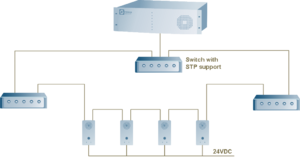Daisy chaining of IP Stations
From Zenitel Wiki
Daisy changing IP Stations reduces cable length
Daisy chain
The IP stations have a built-in two port switch. The ’AUX’ port can be used to connect a second IP station, and to the ’AUX’ port of the second station can be connected to a third station. Up to 10 IP stations can be daisy chained in this way.
Note that the AUX port does not provide power (PoE). The station connected to the AUX port must be connected to local 24 VDC.
Loop configuration, using the spanning tree protocol
- Spanning-Tree Protocol (STP) is a link management protocol that provides path redundancy while preventing undesirable loops in the network. For an Ethernet network to function properly, only one active path can exist between two stations.
- To provide path redundancy, STP defines a tree that spans all switches in an extended network. STP forces certain redundant data paths into a standby (blocked) state. If one network segment in the Spanning-Tree Protocol becomes unreachable, or if STP costs change, the spanning-tree algorithm reconfigures the spanning-tree topology and reestablishes the link by activating the standby path

